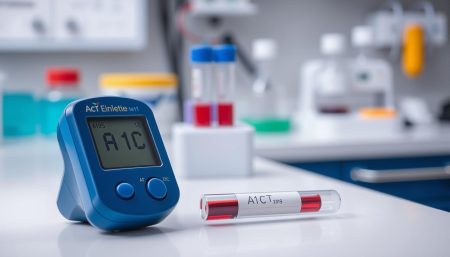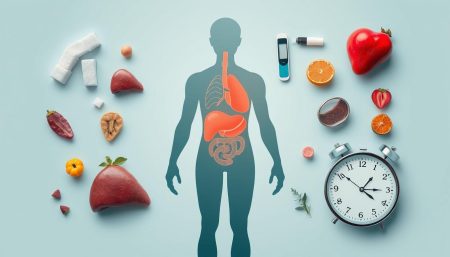The world of health is always changing, but some diseases stay important. Diabetes mellitus type 2 is one of them. It’s a complex and widespread disease.
Learning about it is like starting a journey. It helps us understand a disease that affects millions worldwide. By exploring diabetes type 2 information, we see how it impacts our lives and health.
This introduction is just the beginning. We will dive deep into what is diabetes mellitus type 2. We’ll look at how common it is and its link to public health.
By reading this, you’ll learn important things. It helps you take care of your health better. It also helps us all work together to fight this disease.
Introduction to Diabetes Type 2 Information
Understanding the diabetes mellitus type 2 basics is key for anyone wanting to know about this common condition. Type 2 diabetes is a long-term disorder that causes high blood sugar and insulin resistance. This section will cover the main points of diabetes type 2 information, showing how it differs from type 1 diabetes.
Type 2 diabetes is marked by insulin resistance, where cells don’t respond well to insulin. Over time, the pancreas can’t make enough insulin to fight this resistance. This leads to the slow development of type 2 diabetes. Unlike type 1, insulin production is usually okay at first.
- The role of glucose in the bloodstream and its relation to diabetes type 2.
- Key distinctions between types 1 and 2 diabetes, from onset patterns to insulin involvement.
- Evaluating how lifestyle decisions influence insulin sensitivity and overall metabolism.
Learning about type 2 diabetes starts with understanding key terms and processes. We’ll look at insulin, a hormone that controls blood sugar, and its role in daily health.
| Concept | Description | Relevance to Type 2 Diabetes |
|---|---|---|
| Glucose Metabolism | Process by which body cells extract energy from glucose | Critical in monitoring diabetes, as impaired metabolism leads to elevated blood sugar levels |
| Insulin Function | Hormone that facilitates the uptake of glucose into cells | Understanding diminished function is key to grasping the pathology of type 2 diabetes |
| Insulin Resistance | Condition in which cells fail to respond to insulin efficiently | Core feature of type 2 diabetes, leading to hyperglycemia |
This introduction to diabetes type 2 information lays the groundwork for deeper exploration. It prepares us for understanding how to manage and prevent complications of the condition.
What is Diabetes Mellitus Type 2?
What is diabetes mellitus type 2 is a chronic condition that affects how the body handles blood glucose (sugar). It’s different from type 1 diabetes, where the body can’t make enough insulin. Type 2 diabetes happens when the body doesn’t respond well to insulin or can’t make enough.
Understanding type 2 diabetes is key because it’s a big public health issue. It’s the most common diabetes type and is getting more common worldwide. This is often because of more obesity and less exercise.
It’s important to know the difference between diabetes types for treatment. Here’s a quick comparison:
| Type of Diabetes | Key Characteristics | Common Initial Treatments |
|---|---|---|
| Type 1 Diabetes | Autoimmune destruction of insulin-producing cells, usually leading to absolute insulin deficiency | Insulin injections |
| Type 2 Diabetes | Insulin resistance and eventually reduced insulin production | Diet changes, exercise, and medications |
| Gestational Diabetes | Develops during pregnancy and usually disappears after childbirth, but increases risk of type 2 later in life | Diet modification and insulin if needed |
Understanding diabetes mellitus type 2 means knowing its symptoms. These include feeling thirsty, needing to pee a lot, being hungry all the time, feeling tired, and blurry vision. These signs can get worse if not treated.
Getting diagnosed early and managing it well can improve life quality. It also lowers the risk of serious health problems. So, learning about what is diabetes mellitus type 2 helps those with it manage their health. It also helps in preventing it, which is good for everyone’s health.
Diagnosing Diabetes Mellitus Type 2
Diagnosing diabetes mellitus type 2 involves several key steps. These include blood sugar tests and checking A1C levels. These steps help doctors find the condition early. This allows for the right treatment and care.
Understanding Blood Sugar Tests
Blood sugar tests are key in diagnosing type 2 diabetes. They measure glucose in the blood. These tests are the first step in finding out if you have diabetes.
The main tests are:
- Fasting Plasma Glucose (FPG) Test
- Oral Glucose Tolerance Test (OGTT)
- Random Plasma Glucose Test
Each test has its own rules and levels for diagnosing diabetes.
Recognizing the Importance of A1C Levels
The A1C test is another important tool in diagnosing type 2 diabetes. It shows your average blood sugar over two to three months. If your A1C is 6.5% or higher on two tests, you likely have diabetes.
When to Get Screened for Type 2 Diabetes
Getting screened for diabetes is key, even more so if you’re at risk. This includes being overweight, older, or having a family history. Doctors usually recommend starting at age 45. You’ll need to get tested every three years, or more often if your health changes.
| Test Type | Average Blood Glucose Level | Diagnostic Criteria for Diabetes |
|---|---|---|
| Fasting Plasma Glucose | >126 mg/dL | Fasting for at least 8 hours |
| Oral Glucose Tolerance Test | >200 mg/dL | 2 hours post-glucose consumption |
| A1C Test | >6.5% | Percentage of glycosylated hemoglobin |
Biological Underpinnings of Diabetes Mellitus Type 2
Understanding diabetes mellitus type 2 is key to knowing why it happens. It’s about metabolic dysfunctions that mess up insulin and glucose handling.
Insulin resistance and beta-cell problems in the pancreas are main culprits. Insulin resistance means the body can’t use insulin well. This leads to high blood sugar. Beta-cell issues mean not enough insulin is made to fight resistance.
Metabolic syndrome also plays a big role. It’s a mix of high blood pressure, high blood sugar, belly fat, and bad cholesterol. These together can lead to diabetes and heart disease.
Looking at metabolic pathways in diabetes helps us understand the problem better. These pathways involve many organs and cells. When they’re off, it leads to diabetes type 2.
| Aspect | Effect on Glucose Metabolism | Role in Diabetes Type 2 |
|---|---|---|
| Insulin Resistance | Decreased glucose uptake by cells | Precursor to elevated blood glucose levels |
| Beta-cell Dysfunction | Reduced insulin production | Insufficient insulin to regulate blood glucose |
| Metabolic Syndrome | Increases insulin resistance & inflammation | Aggravates risk for diabetes and cardiovascular issues |
This detailed look shows how diabetes type 2 works. It points to areas for better treatments and management. This could help fight diabetes worldwide.
Causes of Diabetes Mellitus Type 2
Understanding diabetes mellitus type 2 is key. It comes from a mix of biological and environmental factors. These include insulin resistance, genetic predispositions, and lifestyle choices.
The Role of Insulin Resistance
Insulin resistance is a major cause of type 2 diabetes. It happens when cells don’t respond well to insulin. This makes it hard for glucose to get into cells.
The pancreas then has to make more insulin. This can wear it out, leading to high blood sugar. This is a key sign of type 2 diabetes.
Genetic Factors and Type 2 Diabetes
Genetics also play a big part in type 2 diabetes. While no single gene causes it, many genes can lead to insulin resistance. A family history of diabetes often shows a genetic link.
Lifestyle-Related Risk Factors
Lifestyle choices greatly affect the risk of type 2 diabetes. Poor diet, lack of exercise, and obesity are big risks. These lead to too many calories and not enough activity.
Staying healthy with a balanced diet and regular exercise can lower the risk. Keeping a normal weight is also important.
Symptoms of Diabetes Mellitus Type 2
It’s important to spot symptoms of diabetes mellitus type 2 early. This helps manage the condition well and avoid serious health complications. We’ll look at the first high blood sugar signs and the long-term problems it can cause.
Common Signs of High Blood Sugar
There are signs that tell you if your blood sugar is too high, or hyperglycemia. These signs can be mild or serious. It’s key to notice them and act fast to control them.
- Increased thirst and frequent urination
- Extreme fatigue
- Blurred vision
- Slow-healing sores or frequent infections
- Unintended weight loss
Long-Term Health Complications
If diabetes mellitus type 2 isn’t managed, it can cause serious health complications. But, with the right treatment and lifestyle changes, you can reduce these risks a lot.
| Complication | Description | Impact |
|---|---|---|
| Cardiovascular Disease | Involves heart and blood vessels | Increases risk of heart attack and stroke |
| Neuropathy | Nerve damage, mostly in the hands and feet | Can cause pain, numbness, and infection risks in limbs |
| Nephropathy | Kidney damage, affecting kidney function | Potential progression to kidney failure |
| Retinopathy | Damage to the retina of the eye | Can lead to vision impairment and blindness |
The Psychological Impact of Type 2 Diabetes
Getting diagnosed with type 2 diabetes is tough, both physically and mentally. It’s key to understand and handle these mental impacts well.
People with type 2 diabetes often feel stressed, anxious, or depressed. These feelings come from the need to check blood sugar often, fear of health problems later, and changes in lifestyle.
It’s just as important to deal with the psychological effects as it is to manage the physical symptoms. Getting mental health support can make life better and help stick to treatment plans for type 2 diabetes.
- Regular counseling sessions
- Support groups
- Mindfulness and stress-reduction techniques
The table below shows common mental challenges for those with type 2 diabetes and how to face them:
| Psychological Challenge | Coping Strategy |
|---|---|
| Anxiety about future health | Regular consultations with healthcare providers |
| Depression due to lifestyle changes | Engagement in support groups |
| Stress from daily management | Mindfulness exercises and professional mental health support |
Adding mental health support to treatment plans is vital for managing type 2 diabetes well. It helps deal with the disease and boosts overall happiness.
Treatment for Diabetes Mellitus Type 2
Managing diabetes mellitus type 2 needs a mix of lifestyle changes and medical treatments. It’s important to know about treatment options to manage the condition well. We’ll look at medications and insulin therapy and why they’re key to keeping blood sugar levels right.
Medications Used in Managing Type 2 Diabetes
There are many medicines for type 2 diabetes, each working differently to control blood sugar. Metformin is a top choice because it lowers liver glucose production. Knowing how each medicine works helps doctors find the best treatment for each person.
- Sulfonylureas make the pancreas produce more insulin.
- GLP-1 agonists slow digestion and lower blood sugar.
- DPP-4 inhibitors improve blood sugar without causing weight gain.
- SGLT2 inhibitors remove extra glucose through urine.
Insulin Therapy Explained
For some, taking insulin is necessary to manage diabetes. Insulin helps control blood sugar levels, vital for those who can’t make enough insulin. Here’s a look at the different types of insulin:
| Insulin Type | Onset | Duration |
|---|---|---|
| Rapid-acting | 15 minutes | 3-5 hours |
| Short-acting | 30 minutes | 6-8 hours |
| Intermediate-acting | 1 to 2 hours | 12-18 hours |
| Long-acting | 1 hour | 24+ hours |
Picking the right insulin and how to use it depends on health and lifestyle. This shows how insulin therapy is tailored for each person with diabetes.
Dietary Considerations in Managing Type 2 Diabetes
Managing diabetes mellitus type 2 requires big lifestyle changes, like dietary modifications. Eating the right foods helps control blood sugar and keeps you healthy. This reduces the chance of diabetes problems.
For type 2 diabetes, the goal is to balance food types to keep blood sugar steady. We’ll talk about the best foods and those to avoid. This helps keep your health and blood sugar in check.
- Whole grains like quinoa, brown rice, and whole wheat are good. They have a low glycemic index and give lasting energy.
- Leafy greens and non-starchy veggies are full of nutrients and fiber. They help control blood sugar.
- Lean proteins like chicken, turkey, fish, and plant-based options like lentils and beans are great. They help you feel full and keep your metabolism healthy.
- Healthy fats from avocados, nuts, seeds, and olive oil help control blood sugar peaks.
But, some foods can make blood sugar go up and down too much. This can hurt your health:
- Refined sugars and high carb foods like white bread, pasta, and pastries cause quick blood sugar spikes.
- Fried foods and high-fat animal products can make insulin resistance worse.
Table: Impact of Carbohydrates on Blood Sugar Levels
| Food Type | Glycemic Index | Recommended Portion |
|---|---|---|
| White Bread | High (70-90) | Minimal |
| Whole Wheat Bread | Medium (56-69) | Moderate |
| Broccoli | Low ( | Free |
| Quinoa | Low ( | Regular |
In short, choosing the right foods can make managing diabetes mellitus type 2 easier. Talking to a healthcare provider or dietitian can help. They can give advice that fits your health needs and likes.
Physical Activity’s Role in Controlling Diabetes
Regular physical activity is key for controlling diabetes mellitus type 2. It helps keep a healthy weight and makes the body more responsive to insulin. This can greatly lower blood sugar levels and bring many physical activity benefits.
For those with type 2 diabetes, it’s best to mix aerobic exercises, strength training, and flexibility activities. Each type of exercise is important for health and helps control blood sugar.
- Aerobic Exercises: Walking, swimming, and cycling are good for the heart and blood flow. They also help lower blood sugar.
- Strength Training: Using weights or resistance bands builds muscle. Muscle burns more glucose and reduces insulin resistance.
- Flexibility Activities: Yoga and stretching keep joints flexible and reduce stress. Stress can affect blood sugar levels.
Regular exercise does more than just control blood sugar. It also lowers the risk of heart disease, a big concern for people with diabetes. So, exercise boosts fitness and helps manage controlling diabetes mellitus type 2.
To get the most from exercise, be consistent. Experts say to do moderate activity for at least 150 minutes a week. This can be as simple as taking more steps, using stairs, or trying hobbies like gardening or dancing.
In short, an active lifestyle is vital for those with type 2 diabetes. It not only helps manage controlling diabetes mellitus type 2 but also improves overall health and life quality. This shows the big physical activity benefits.
Managing Diabetes Mellitus Type 2 with Lifestyle Modifications
Managing diabetes mellitus type 2 needs a mix of lifestyle changes. Focusing on weight and stress can help improve health and control blood sugar.
Weight Management Strategies
Weight management is key for diabetes type 2. Losing weight can make insulin work better, lower blood sugar, and prevent health problems.
- Set realistic weight loss goals for slow, steady weight loss.
- Adopt a balanced diet with lots of nutrients, less processed foods, and sugar.
- Do regular physical activity, like cardio and strength training.
Stress Reduction Techniques
Stress makes diabetes worse by affecting blood sugar. It’s important to find ways to reduce stress for better health.
- Try mindfulness and meditation to handle stress better.
- Regular physical exercise helps with weight and stress.
- Make sure to get enough sleep and relaxation to help your body recover and lower stress.
By making these lifestyle changes, managing diabetes mellitus type 2 becomes easier. Here’s a comparison of lifestyle strategies and their health benefits:
| Lifestyle Change | Benefits | Challenges |
|---|---|---|
| Weight Management | Improves insulin sensitivity, reduces blood glucose levels | Maintaining motivation, finding the right dietary balance |
| Stress Reduction | Improves mental health, lowers blood glucose spikes | Consistency in practice, integrating into daily routine |
Monitoring and Maintaining Blood Glucose Levels
Managing diabetes well means keeping a close eye on blood glucose monitoring and maintaining blood sugar levels. This helps avoid dangerous lows and highs. It also lowers the risk of serious diabetes problems later on.
There are many tools and methods to help control blood sugar levels. Here’s a look at the main ones used every day:
- Traditional blood glucose meters: These devices need a small blood sample, usually from a finger prick.
- Continuous glucose monitors (CGMs): A CGM shows glucose levels in real-time through a skin sensor.
- Insulin pumps: Used with CGMs, insulin pumps give precise insulin doses based on glucose readings.
Following a strict blood glucose monitoring plan helps make smart choices about diet, exercise, and medicine. Here’s a table showing a typical monitoring schedule for someone with Type 2 diabetes using technology:
| Time of Day | Blood Glucose Goal (mg/dL) | Notes |
|---|---|---|
| Before meals | 80-130 | Adjust food intake or medication if readings are out of this range. |
| 1-2 hours after meals | Less than 180 | Check postprandial sugar spike to assess meal-related decisions. |
| Bedtime | 100-140 | Stable levels are key to avoid overnight hypoglycemia. |
Keeping blood sugar levels in check also means making lifestyle changes. This includes better nutrition, regular exercise, and managing stress. It’s also important to talk to healthcare providers about blood glucose results and any needed treatment changes.
Effective diabetes management is all about regular and accurate blood glucose monitoring. It lets people take charge of their health and stops serious diabetes problems from happening.
The Importance of Regular Medical Checkups
For those with diabetes, regular medical checkups are key. They help track the disease’s changes and adjust treatments. These visits catch problems early and keep diabetes management on track.
Healthcare teams look at both body and mind during these visits. They see how diabetes affects you and how well treatments work. This helps make changes to meds or lifestyle as needed.
Diabetes management is more than just blood sugar control. It also means checking for other health issues. Things like heart disease, kidney problems, and nerve damage need regular checks.
Working with different healthcare providers is also important. Endocrinologists, dietitians, and general doctors all play a part in diabetes care. Knowing early signs of related conditions can help too. It means getting treatment sooner.
| Provider | Role in Diabetes Care | Checkup Frequency |
|---|---|---|
| Endocrinologist | Manages hormonal and metabolic aspects of diabetes | Every 3-6 months |
| Dietitian | Advises on nutritional plans to manage blood sugar levels | Every 3-6 months |
| General Practitioner | Provides overall health monitoring and other non-diabetes related care | Annually or as recommended |
In short, regular medical checkups are very important for diabetes management. They help keep you healthy and prevent serious problems.
Emerging Research and Future Treatments in Type 2 Diabetes
The world of future treatments for diabetes mellitus type 2 is changing fast. New emerging research is bringing hope. It’s making it possible to manage this common disease in new ways.
New research is not just about better drugs. It’s also about making treatment easier and more convenient. The mix of technology and medicine is leading to better care.
- New drug forms aim to control blood sugar better with fewer side effects.
- Gene therapy could lead to treatments that cure diabetes.
- Advanced glucose monitors are getting more accurate and easier to use.
- The artificial pancreas is getting closer to making insulin delivery automatic.
| Research Area | Description | Potential Impact |
|---|---|---|
| Gene Editing Techniques | CRISPR and other tools to fix insulin resistance at the genetic level. | Could lead to long-term remission of diabetes symptoms. |
| Smart Insulin Patches | Patches that detect blood sugar and release insulin as needed. | Improves blood glucose management, reducing daily monitoring burden. |
| Incretin-Based Therapies | Drugs that mimic gut hormones to increase insulin release after meals. | Enhances natural insulin secretion, offers a more natural way to manage diabetes. |
| Neural Modulation | Uses technology to influence vagus nerve signals to regulate glucose levels. | Potentially reduces insulin needs and improves glucose control. |
Understanding these emerging research areas gives hope to patients. As these technologies move from labs to clinics, they will change diabetes care a lot.
Support and Resources for People with Diabetes Mellitus Type 2
Living with Diabetes Mellitus Type 2 needs ongoing support and reliable resources. The right support network helps manage daily and long-term health challenges. Diabetes education programs are key, teaching about nutrition, medication, and lifestyle changes for Type 2 diabetes.
Support groups are also very important. They connect people to others who get what they’re going through. These groups share experiences, offer encouragement, and provide tips for living with diabetes. Online resources offer quick access to information, including forums, articles, and research updates.
Patient advocacy groups are vital, fighting for diabetes rights and better care. They help shape public policies and improve treatment access. By joining these efforts, people with Type 2 diabetes can feel empowered and manage their condition better.
FAQ
Q: What is Diabetes Mellitus Type 2?
A: Diabetes Mellitus Type 2 is a long-term condition. It affects how the body handles blood sugar (glucose). Unlike Type 1 diabetes, where the body can’t make insulin, Type 2 diabetes means the body either makes too little insulin or can’t use it well.
Q: What causes Diabetes Mellitus Type 2?
A: Diabetes Type 2 comes from a mix of genetic and lifestyle factors. Insulin resistance, where cells don’t respond to insulin, is a big part of it. Other factors include being overweight, not being active, eating poorly, genetics, and age.
Q: What are the symptoms of Diabetes Mellitus Type 2?
A: Symptoms include needing to pee a lot, feeling thirsty, being tired, blurry vision, and cuts healing slowly. Some people might not show symptoms early on.
Q: How is Diabetes Mellitus Type 2 diagnosed?
A: Doctors use blood tests to diagnose it. These include fasting plasma glucose, oral glucose tolerance test, and A1C tests. These tests show blood sugar levels over the last three months.
Q: What treatments are available for Diabetes Mellitus Type 2?
A: Treatments include changing your diet and being more active. You might also take oral medications or insulin. Each person’s treatment plan is different, based on their health needs.
Q: Can lifestyle changes really help manage Diabetes Mellitus Type 2?
A: Yes, making lifestyle changes can help a lot. Eating right, staying active, and managing stress can keep blood sugar levels normal. Sometimes, it’s enough to control diabetes without medication.
Q: What is metabolic syndrome and how is it related to Diabetes Mellitus Type 2?
A: Metabolic syndrome is a group of conditions that raise the risk of heart disease and diabetes. It includes high blood pressure, high blood sugar, excess belly fat, and bad cholesterol. Insulin resistance is a key part of it.
Q: Is there any psychological impact associated with Diabetes Mellitus Type 2?
A: Managing diabetes can be stressful and lead to anxiety and depression. It’s important for people with diabetes to get psychological support if they feel this way.
Q: Why are regular medical checkups important for someone with Diabetes Mellitus Type 2?
A: Regular checkups help track diabetes and prevent complications. Healthcare providers can adjust treatment plans and offer support and education on living with diabetes.
Q: What sort of research is emerging for future treatments of Diabetes Mellitus Type 2?
A: New research includes better medications, pancreatic islet transplantation, advanced glucose monitoring systems, and gene therapies. These could lead to new treatments for diabetes.


















